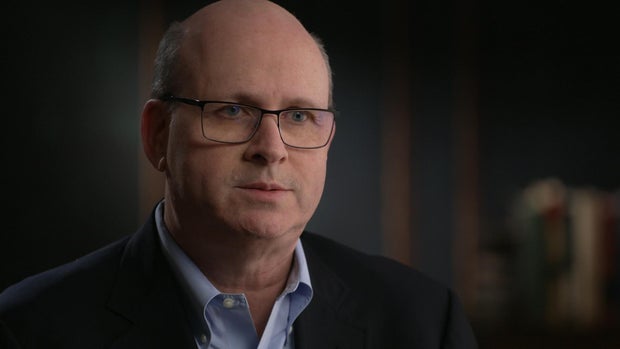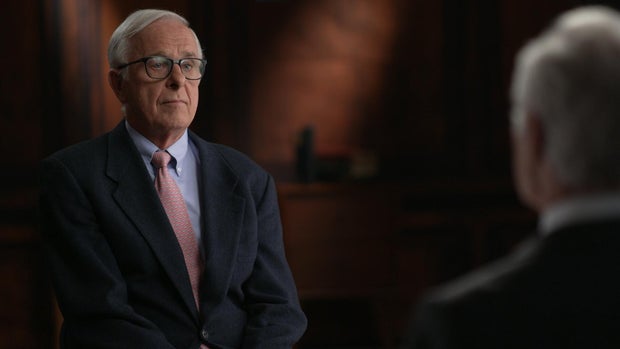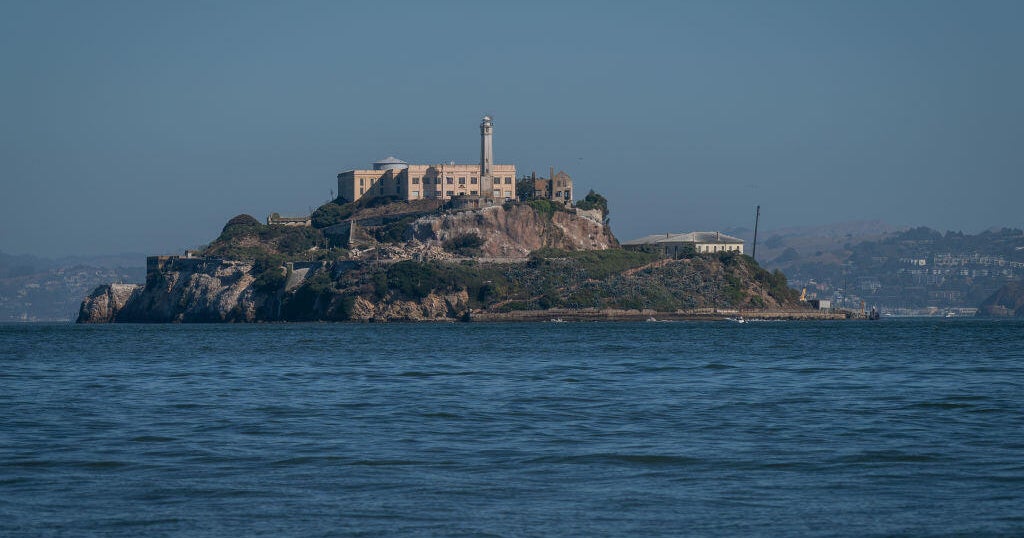It was nearly impossible to get anyone on camera for this story because of the fear now running through our system of justice. In recent weeks, President Trump has signed orders against several law firms — orders with the power to destroy them. That matters because lawsuits have been a check on the president's power. Many firms and attorneys have been targeted, among them Marc Elias, a long time opponent of Trump who is the only lawyer the president has named who was willing to appear on 60 Minutes. Elias, and others, are warning that Trump's assault on the legal profession threatens the rule of law itself. Elias says that for him, it began with the president's personal grudge.
Marc Elias: Donald Trump hates me because I fight hard, and I fight for free and fair elections. I insist on fighting for democracy in court, fighting for voting rights in court, and insist on telling the truth about what the outcome of the 2020 election was.
Scott Pelley: Are there risks in doing the work that you're doing?
Marc Elias: I'd be an idiot not to be worried. The question though is what do you do? Right, do you just cower in the corner? Do you just try to disappear? Do you just leave democracy to-- fend for itself? Or do you stand tall and do the best you can every day to-- represent your clients and try to preserve the rule of law?
Marc Elias first crossed Trump in 2016. He was the top lawyer for the Clinton campaign. Then, in 2020, when Trump and allies challenged the election results, Elias fought in court and won. Trump calls him a "thug."
Marc Elias: Donald Trump is the walking embodiment of everything that is wrong with the American political system. And so, when Donald Trump says that I am unethical or that I am undermining his vision of America, I say, "Boy, I must be doin' something right."
 Marc Elias
60 Minutes
Marc Elias
60 Minutes
Elias was top of mind for Trump this past March, both he and another lawyer who had once investigated the president.
President Trump (March 14, 2025 Department of Justice remarks): With the help of radicals like Marc Elias, Mark Pomerantz. And these are people that nobody's ever seen anything like it. So many others, but these are people that are bad people, really bad people. They tried to turn America into a corrupt, communist and Third World country. But in the end, the thugs failed, and the truth won.
Beginning in February, the president signed the orders attacking the law firms.
President Trump (Feb. 25, 2025 in the Oval Office): Wait, I just want to savor this one please…
Six firms in six weeks, including Marc Elias' former firm. Each had a connection to an investigation or legal case related to Trump or his allies, including Robert Mueller's 2017 probe of Russian election meddling, subversion of the 2020 election, and alleged mishandling of classified documents.
President Trump (March 6, 2025 in the Oval Office): This is an absolute honor to sign. What they've done is -- it's just terrible.
Targeted firms say what the president signed amounted to a corporate death penalty.
President Trump (March 6, 2025 in the Oval Office): — and it should never be allowed to happen again.
The orders threatened to bar attorneys from where they work, courthouses and federal agencies and cancel the contracts of law firm clients. For example, an aerospace company could lose its federal contracts if it stayed with the firm. A senior partner at one firm told us the president's orders were, quote, "diabolical." "Intended to bankrupt [us]." He said, within hours, his major clients were threatening to drop his firm. It took only a matter of days before America's wealthiest and most powerful law firms buckled.
In a shock to the legal community, nine major firms went to the White House to make a deal. Some say they were pressured, not by a written order, but by a message from the White House threatening an order.
Marc Elias: It is trying to intimidate them the way in which a mob boss intimidates people in the neighborhood that he is seeking to either exact protection money from or engage in other nefarious conduct. I mean, the fact is that these law firms are being told, "If you don't play ball with us, maybe somethin' really bad will happen to you."
The nine firms did not admit wrongdoing but, altogether, they agreed to give nearly $1 billion in legal services to causes that the firms and Trump support.
Donald Ayer: Our whole system of government is at stake.
Attorney Donald Ayer should know. He argued before the Supreme Court for the Reagan administration. He was deputy attorney general for George H. W. Bush. Today, he teaches at Georgetown Law.
 Donald Ayer
60 Minutes
Donald Ayer
60 Minutes
Donald Ayer: The idea that the president would issue executive orders aimed at any either specific person or organization and stating that they're being punished because they're doing things that are politically disapproved by the people in power, that-- that is completely unprecedented.
Scott Pelley: Nobody has that right including the president?
Donald Ayer: No, absolutely not, I think the president, president's an elected person, and he has the right to do a great many things. But he doesn't have the right to essentially cancel out your right to have a lawyer of your choosing represent you in court by scaring the lawyer through threats that their personal livelihood will be destroyed.
Now, America's legal community is torn between those who want to fight and those who made a deal. One firm that reached an agreement with Trump was Skadden Arps, where attorney Brenna Frey resigned in protest.
Brenna Frey: I think the message it sends to the country is power is what matters. If you have power, you can exercise that power however you want. And if that's true, why have a legal system at all? Why have law firms or lawyers at all.
Scott Pelley: You thought that Skadden would fight?
Brenna Frey: Absolutely.
Scott Pelley: Why did you think so?
Brenna Frey: Because that's a foundational principle of the firm, that we are zealous advocates for the law.
Scott Pelley: Why did this mean so much to you that you felt you had to quit?
Brenna Frey: The law firm is tacitly saying, we'll listen to the administration, we won't fight in court. If we won't fight over this, what else won't we fight over in court against the federal government?
In a note to its staff, Skadden Arps called its deal with Trump "...extraordinarily difficult..." but "...the best path to protect our clients, our people, and our Firm."
Brenna Frey: I think that they're naïve if they think this makes the issue go away.
Scott Pelley: Naive? What do you mean?
Brenna Frey: There was nothing in these agreements that prevents the president from issuing another executive order against the law firm in the future.
 Brenna Frey
60 Minutes
Brenna Frey
60 Minutes
Donald Ayer: Someone must stand up to this because it is a direct attack on the whole functioning of our judicial system.
Four firms are standing up and fighting in court. Judges protected them with temporary restraining orders. Law professor Donald Ayer says, in his view, Trump's orders violate the constitutional rights to free speech, due process and the right to counsel.
Donald Ayer: Everyone's got a right to a lawyer. Everyone's got a right to go to court. And it's something we've always assumed to be true, and now it's threatened.
Scott Pelley: So, if the president targets a few specific law firms, the message to law firms across the country, in a nutshell, is what?
Donald Ayer: I think the message is that this can happen to you. But it's a real effort to prevent // zealous representation of your clients' legal interests // when that results in something unacceptable to the administration.
John Keker: You're at the mercy of the government and it really, it's like a protection racket.
John Keker is a prominent attorney and Democrat in San Francisco.
Scott Pelley: You're not suggesting that the president's running a protection racket.
John Keker: I am, I'm suggesting that he is violating the rule that says, "you can't offer a thing of value in return for an official act." That happens to be the definition of bribery. Anybody else who came to Washington and said, "I will give you $100 million of free legal services if you do this for me," would be convicted of a bribe.
Keker is helping recruit law firms, nationwide, to fight back. More than 500 firms, large and small, have signed up in support.
John Keker: We don't have to agree on politics, but we do have to agree that the legal profession has to protect the rule of law in the United States which means lawyers and judges need to be independent from the executive branch.
Scott Pelley: If the president brings the legal profession to heel what situation is the country in then?
John Keker: No rule of law. You're in a dictatorship. That's what's happened in China. It happened in Russia. These are legal systems that look like legal systems, but in fact are controlled by a dictatorship.
 John Keker
60 Minutes
John Keker
60 Minutes
President Trump (March 24, 2025 during investment announcement): I just think that the law firms have to behave themselves.
Trump's attack on the law firms has been described by a federal judge as "...a personal vendetta..." None of his targets is charged with any crime. Trump, however, was indicted by federal grand juries in cases about the 2020 election and allegedly concealing classified documents. He pleaded not guilty. Those prosecutions were dropped only because he was reelected. Last year, a state jury convicted him of falsifying business records, making him the first felon in the Oval Office.
President Trump (Feb. 25, 2025 in the Oval Office): I've been targeted for four years longer than that. So, you don't tell me about targeting. I was the target of corrupt politicians for four years and then four years after that. So don't talk to me about targeting.
In Trump's defense, government lawyers argue in court that his orders against the firms ensure that tax money is not supporting "...unlawful or unsavory practices..." Another filing says the executive branch is merely "…managing who it does business with…" not punishing anyone.
And, the government argues that the orders are quote, "...well within the scope of Presidential prerogative."
President Trump (March 21, 2025 in the Oval Office): Well, the law firms all want to make deals. You mean the law firms that we're going after, that went after me for four years, ruthlessly, violently, illegally? Are those the law firms you're talking about? They're not babies. They're very sophisticated people. Those law firms did bad things, bad things. They went after me for years, Russia, Russia, Russia, hoax, all a hoax.
What Trump means by "a hoax" were allegations in 2016 of shady dealings with Russia by Trump and his campaign. He's right that the FBI "could not corroborate" what was described as "rumor." At least one allegation was "promote[d] to the media…" by Clinton campaign representatives when Marc Elias was general counsel. In this memo, six weeks ago, Trump says Elias is an "example" of "...grossly unethical misconduct..." The president directs the attorney general to seek sanctions against any lawyer, anywhere, for "...unreasonable, and vexatious..." litigation against the government. "Unreasonable," apparently, in the eye of the president.
Scott Pelley: Are we reaching a point where a person will go to a law firm with a case that is opposed to the president of the United States and the law firm will think, "Do we really wanna take this case?"
Marc Elias: We're already there. They are deciding not to take on certain kinds of clients that might upset the administration or not taking on certain kinds of causes that might put them in the crosshairs of the administration.
Scott Pelley: If lawyers give up their independence, what is lost?
Marc Elias: The rule of law. And this is why the business community ought to care. Today, it might be that, you know, Donald Trump thinks he can take over the election system through one of his executive orders. Tomorrow maybe it's the banking system. After that, maybe it's contracts. Maybe he decrees I'm gonna decide which contracts are binding and which contracts aren't binding. So, the legal system is fundamental to how our society operates, how capitalism operates, and everyone should have a stake in that.
Conservative law professor Donald Ayer is optimistic the courts will strike down the president's orders. The question, then, he told us, is whether Trump will obey.
Donald Ayer: This is a very big deal. What's happening now is a very big deal. It's a whole 'nother chapter in our history, and we need to call upon the values that have brought us to where we are in order to get through it.
In a late development Friday evening, a federal judge permanently blocked President Trump's order against one of the law firms, saying that the order is unconstitutional. No word yet on whether the administration will appeal.
Produced by Maria Gavrilovic. Associate producers, Alex Ortiz, Georgia Rosenberg and Michelle Karim. Broadcast associate, Mimi Lamarre. Edited by Joe Schanzer.
More from CBS News
Scott Pelley



